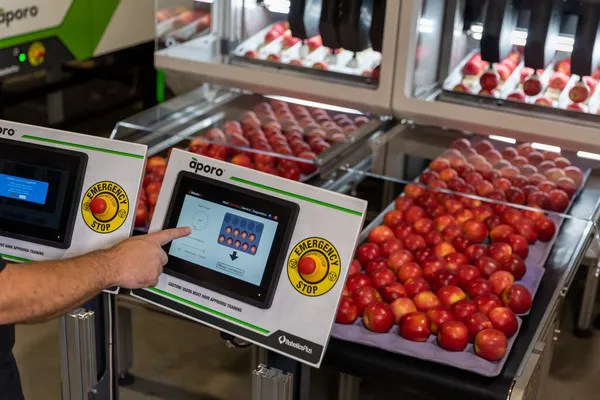An intelligent robotic fruit packing machine that automates the most labour intensive job in the packhouse is proving to be a game-changer for post-harvest operators around the globe.
Global Pac Technologies has officially unveiled the Aporo II robotic produce packaging machine which builds on the proven technology of the original Aporo I Produce Packer, first developed in 2018. The latest model can now accommodate twice the throughput, packing 240 fruit per minute, saving between two and four labour units per double packing belt.
“Aporo II can be retrofitted across two packing belts instead of one, so it has effectively doubled the throughput and the labour saving that Aporo I could deliver,” explains Cameron McInness, Director of Jenkins Group – a New Zealand-based company which co-founded Global Pac Technologies with US-based Van Doren Sales Inc.

“We have been rolling out this new machine with some key customers globally and the results have been dramatic. One of our Australian customers built a new packhouse and installed three of our Aporo II’s. That increased their packhouse production by 30-40 percent and reduced their labour by 50 percent. Automating the process of placing fruit into trays then allows post-harvest operators to redeploy their scarce labour resources to areas where they can add more value.”
McInness says Aporo II’s dual robotic heads are more consistent and reliable than human packers. The technology is now being used in France, the UK, Sweden, Belgium, the US, Australia and New Zealand – primarily to pack apples, and now stone fruit like peaches and nectarines. Work is underway to extend its use to other fruit varieties in the near future.
“What’s unique about Aporo I and Aporo II is they are designed for really simple autonomous packing. The machine is very intelligent. It looks at the fruit, orientates the fruit and doesn’t need to be told what type of trays you’re using – it just looks and finds the pockets. It’s really powerful technology.
“Its internal vision system or ‘neural network’ is continuously learning to adapt to different fruit varieties and improve performance over time. It features automatic tray pocket recognition for any tray type and the touch screen interface is very intuitive and easy to use. Not only will it orientate and place fruit the right way on the tray, you can also ask it to find the best colour on the apple and spin that side up. It’s very clever.”
The Aporo machines can be retrofitted to existing packhouse infrastructure within a matter of hours in some cases. It straddles existing conveyors and is available in configurations for both single and double packing belt layouts.
Since Aporo I’s initial launch in 2018, over 100 packing belts have had the technology deployed on them around the world. McInness says a strong pipeline of orders have already been received for Aporo II. “We have a couple of big growth opportunities in California right now and we will be meeting with distributors and customers at Fruit Logistica (5-7 April 2022) in Berlin to show what Aporo II can really do.”
Global Pac have developed great relationships with their current worldwide distributors and are open to discussions with potential distributors who are interested in bringing Aporo II to their region.
The Aporo I and II packers have been developed by New Zealand agritech business Robotics Plus. Global Pac Technologies was then formed as a joint venture to sell the technology to the global market.
“We are the market leaders in this space and our customers are having real success,” McInness says. “The global apple market is worth approximately US$80 billion and automation is key to overcoming the worldwide labour shortage that all post-harvest operators are experiencing. The beauty of Aporo I and Aporo II is they can be installed on both new and existing packing lines, making this technology accessible to everyone.”
For more information:
Bree McGavin
Tel: +64 21 041 0048
